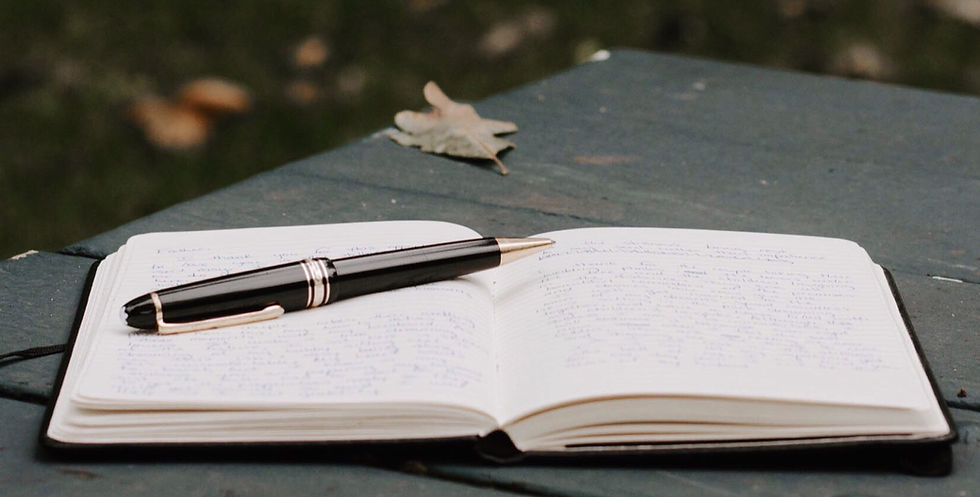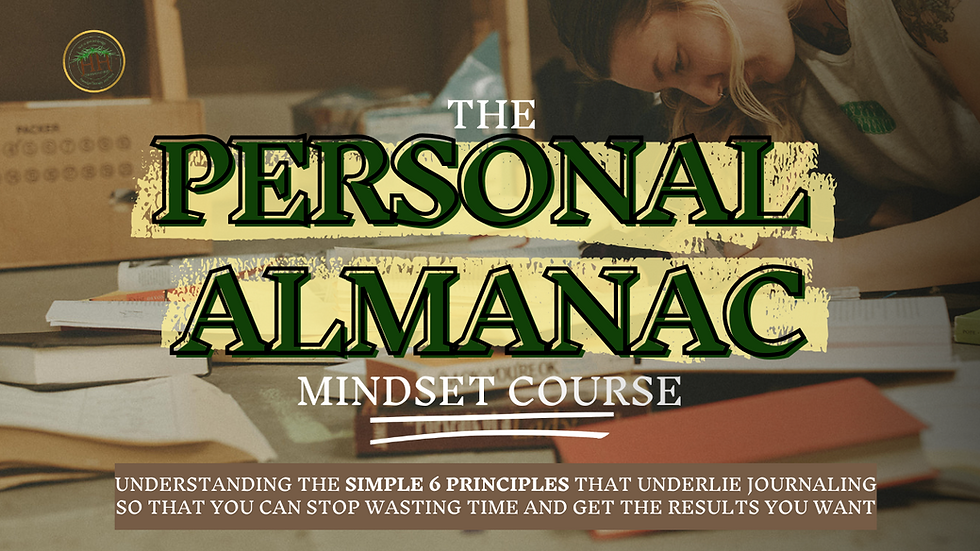Why Journal: The Magic in Putting Pen 2 Paper
- SHAE

- Apr 23
- 4 min read

We begin.
We have a book or a document open in front of us. A blank page. A pen in our hands or our fingers at the keys… and we are in silence.
By ourselves.
“Well, I don’t know what to say. I don’t like how that sounds. What words should I use?"
That gentler voice in your head says 'Write out the frettishness going on in your mind.'
"Well that isn't good enough! It isn't important enough. It's meaningless! Why commit that to the page? If I leave a legacy it’s going to be that!?"
That gentle voice is now too gentle to even hear. No more thoughts come.
You've paralyzed yourself.
"Why am I even here?” you huff as you slam the book closed.
Hint: There’s literally no right or wrong way to journal.
In the land of the living, of bustling streets, duties, and expectations you are constantly learning to hit your mark or get the hell out. Whether it be tightening a corset, being told to close your mouth, shut your legs, avert your eyes or cover your ears, throughout human history the lesson has been clear: conform (and conceal what you can't). Be objective or be nothing at all!
It is about time that we learn to undo our pants like a middle-aged man after a holiday dinner and let it all hang out.
Allow things to be simple. Allow yourself to play. Allow yourself silences.
Journaling is about legitimizing your subjective experience.
The objective is accounted for. Everywhere. All the time. Clung to, even, as if the subjective is a gnarly beast that could pull you over to the dark side if you don’t attend to convention gingerly. But the truth is that the subjective - your perspective - must be accounted for, too.
In my podcast, SENSI: Relcaiming Your Experience (aka. A podcast about, for, and by sensitive people) I remark that in my life I have been told a nauseating amount of times ‘You take yourself too seriously!’ (as in 'you're the cause of your own suffering. Get over yourself!') What I have found is that taking myself more seriously is exactly how one removes themselves from that sullying experience of being repeatedly disqualified.
When it comes down to it, your experience is having an impact on you, and that impact is meaningful. It dictates the meaning of your life. It informs the quality of your life. That is significant.
Your experiences each have their own particular, unique, divine meaning. No more. No less. They are just the right amount. They are enough.
Legitimizing your lived experience is not about denying or overriding external reality or objectivity. It is you saying 'I am experiencing this right now.' It is you claiming ‘This is my experience.’
Albert Einstein, Theodore Roosevelt, Frida Kahlo, Salvador Dalí, Plato, etc.
The people and the names that we recognize, the people we see as formidable, successful, intelligent, etc., all journaled to elucidate their own magic. And they were able to do so because they saw themselves as legitimate.
It wasn’t that they were right or faultlessly objective. Their reasoning wasn’t absolute. Neither did they understand some sort of mystical knowledge and how to decode what mere peasants such as you and I could not. They fumbled their way through. They made many a happy accident. They took their curiosity seriously.
This practice was them exercising their problem solving skills. This practice of playful curiosity, of testing limits and exploring perspectives - in having fun - one of the happy accidents that came to be was confidence, resiliency, and a sense of agency.
Agency is the capacity of individuals to have the power and resources to fulfill their potential.
This makes you cardinal.
Simply by writing things down. Allowing something to come up from the silence and allowing those somethings to be important enough to write down.
The key to legitimizing your subjective experience is in the not stopping yourself.
Hint: This means allowing yourself silences and not making them mean that you’re doing something wrong.
The six touchstones I lay out in The Personal Almanac Mindset Course help us bridge the gap between experiencing life as a casualty and experiencing life with agency. We must see ourselves, our experiences, and our lives as legitimate.
The six touchstones of self-study look like this:
Be honest with yourself This is about you seeing yourself, not appearing to be what conventional standards expect.
Face your resistance Socialization runs deep and we have to be willing to meet that internalized shame and continue on.
Make change your friend The former two allow change - a natural state - to do its thing. In the course I describe this change as a homecoming.
Trust the information you receive We are a trustworthy source. Our experience isn’t absolute but we are safe in our subjectivity.
Forgive yourself (readily) You are going to find lies, avoid things, twist things, and will at times bring to the forefront aspects of yourself you don’t like. If we don’t forgive ourselves it serves as resistance and we won’t be able to be honest with ourselves.
Let it be simple. It is this simple. We make it complicated when we lie, resist, and punish ourselves.
These touchstones hold your metaphorical hand when you’re in doubt, when you’re confused, frustrated or lost. These touchstones help you begin again.
Paper before you. Hand poised.
"What do I say? Is that really worth my time? But is it deeper than that? Is that really The Big Important Thing I have to say? Is this who I really am?"
And then the touchstones bring you back to yourself, and that gentle voice can come back in once more:
‘It all is. Let it ALL come out.’
You bet, much of what we initially commit to the page is inarticulate and horribly calibrated, but that doesn’t change the fact that:
Your existence is enough of a reason to take note.
And that includes the petty shit your mother cautioned you against.
Do yourself a favour and bear witness.




Comments